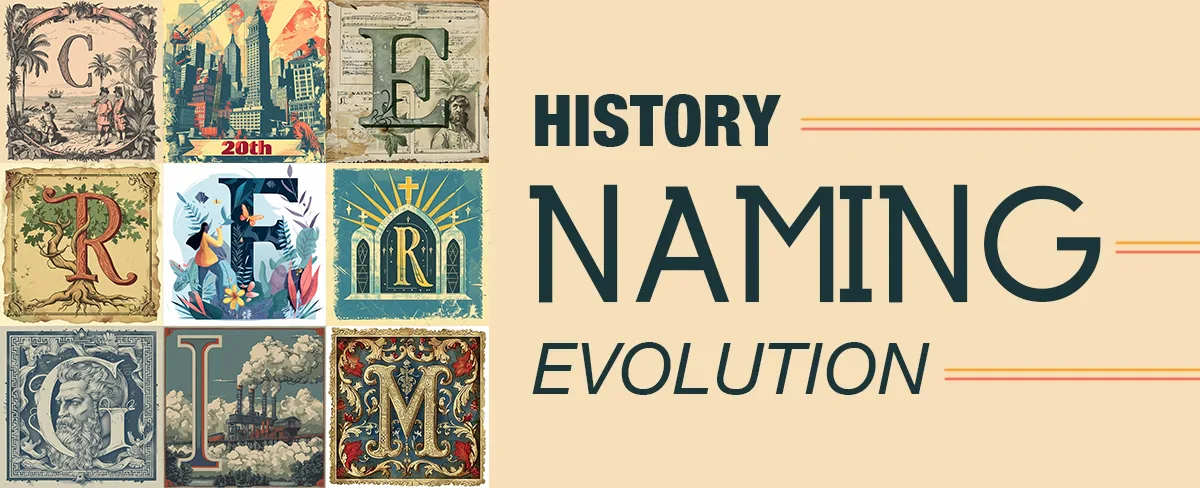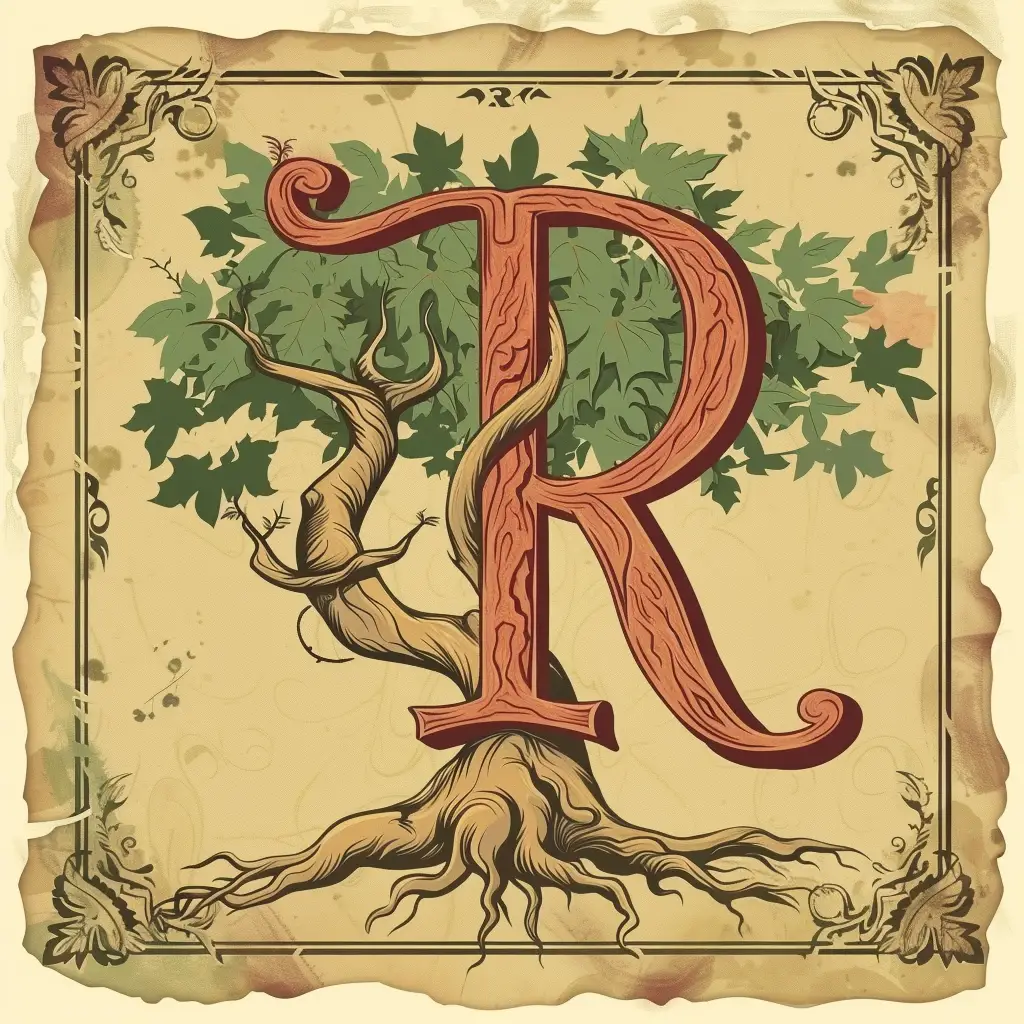
In the field of onomastics, the study of names, one can find an intriguing journey through the annals of human history. From ancient times to present day, the derivations and nomenclature of names have evolved with the changing origins of language and civilization. This fascinating exploration uncovers the interplay between anthroponyms (personal names) and toponyms (place names), revealing the hidden stories behind the etymology of names and their significance in our lexicon.
The origins of personal names can be traced back to the earliest human societies, where they held immense cultural and societal importance. These anthroponyms often carried deep meanings, reflecting aspects of a person's identity, familial lineage, or even religious beliefs. The etymology of these names provides valuable insights into the history, language, and customs of past civilizations, shedding light on their social structures and cultural practices.
Try our modern AI naming generator
Similarly, toponyms offer a captivating glimpse into the past, as they are the names given to geographic locations. These names can reveal the historical events, cultural exchanges, and even environmental characteristics of a region. The study of toponymy not only unravels the stories behind the names of cities, towns, and landmarks but also showcases the evolution of languages and the interactions between different cultures throughout history.
The Origins of Names
The study of names is a fascinating exploration of the human lexicon and the evolution of language and culture. The field of nomenclature, or the study of naming systems, encompasses a wide range of disciplines such as etymology, onomastics, and anthroponyms.

Etymology: Tracing the Roots
Etymology, the study of word origins and derivations, plays a crucial role in understanding the origins of names. By tracing the linguistic origins of a name back to its roots, etymology provides valuable insights into the historical context and cultural influences that shaped the naming conventions of different periods.
Onomastics: Beyond Words
Onomastics, the study of names, goes beyond mere linguistics and delves into the social, cultural, and historical contexts in which names are given and used. This interdisciplinary field explores not only the meanings and significance of individual names but also the broader patterns and trends in naming practices.
Through onomastics, researchers can uncover fascinating insights into the socio-cultural aspects of naming, such as the role of names in reinforcing social hierarchies, ethnic identities, and gender norms.
The Origins of Surnames
One particular area of interest in the study of names is the origins of surnames. Surnames, or family names, have a rich and varied history that reflects a wide range of influences, including occupations, locations, and personal characteristics.
For example, the surname Smith likely originated from the occupation of blacksmiths, while the surname Johnson can trace its origins to the given name John. By exploring the etymology and historical context of surnames, researchers can gain deeper insights into the social and cultural factors that contributed to their development.
The study of names and their origins is an ongoing journey, uncovering the intricate web of language, culture, and history that shapes our identities. From etymology to onomastics, the exploration of names opens up a world of discovery and understanding.

Early Naming Conventions
In the early stages of human history, naming conventions played a crucial role in communication and identity. The development of nomenclature, etymology, toponymy, and onomastics allowed societies to navigate their growing lexicon and establish a sense of belonging.
Nomenclature and Etymology
Nomenclature, the act of assigning names to things, emerged as a way for early humans to make sense of the world around them. Through etymology, the study of word origins, they could trace the derivations of names and discover their underlying meanings. This process enhanced their understanding of the natural and cultural phenomena they encountered.
Toponymy and Anthroponyms
Toponymy, the study of place names, and anthroponyms, the study of personal names, further expanded naming conventions. These disciplines provided insight into the history, culture, and geography of various regions and communities. Toponymy allowed people to navigate their surroundings, while anthroponyms carried the stories and identities of individuals.
For example, the name "London" derives from the Roman name "Londinium," reflecting the city's Roman origins. Similarly, surnames such as "Smith" or "Taylor" indicate a person's ancestral occupation, showcasing the importance of names in preserving historical and cultural information.
As societies grew more complex, and populations expanded, the need for standardized naming conventions became evident. This led to the adoption of surnames, which provided a way to differentiate individuals and establish familial connections. Surnames often derived from the names of professions, locations, or personal characteristics, reflecting the diverse influences on naming practices.
| Naming Convention | Definition |
|---|---|
| Nomenclature | The act of assigning names to things |
| Etymology | The study of word origins |
| Toponymy | The study of place names |
| Anthroponyms | The study of personal names |
| Lexicon | A collection of words and their meanings |
| Derivations | The process of obtaining a word from another word |
| Surnames | Family names passed down through generations |
Throughout history, naming conventions have continuously evolved, reflecting cultural shifts, migrations, and societal changes. Understanding early naming practices offers valuable insights into the development of language, identity, and human history as a whole.

The Influence of Greek Mythology
Greek mythology has had a significant impact on the evolution of naming practices throughout history. The rich pantheon of gods and goddesses, as well as the heroes and creatures of Greek mythology, have contributed to the creation of numerous anthroponyms (personal names) and surnames.
The influence of Greek mythology is evident in the nomenclature of various cultures and societies. Many names have origins rooted in Greek mythology, with individuals being named after gods, goddesses, or mythological figures. The widespread usage of these names showcases the lasting impact of Greek mythology on the lexicon of different languages.
Toponymy, the study of place names, is another area where Greek mythology exerts its influence. Many cities, towns, and geographical features around the world have names derived from Greek mythology. For example, the city of Athens in Greece is named after the goddess Athena, while the states of New York and Chicago in the United States have names with Greek mythological origins.
Onomastics, the study of names and their origins, often involves tracing the etymology of names back to their Greek mythological roots. This process helps scholars and researchers understand the historical and cultural significance behind different names.
In conclusion, Greek mythology has left an indelible mark on the evolution of naming practices. Its influence can be seen in anthroponyms, surnames, nomenclature, toponymy, lexicon, onomastics, and etymology. The enduring power of Greek mythology continues to shape the way we name things and people, providing a glimpse into our shared cultural heritage.
The Impact of Roman Naming Customs
The Romans had a significant impact on the evolution of naming customs throughout history. Their meticulous approach to naming, derived from their deep understanding of anthroponyms and nomenclature, laid the foundation for the modern field of onomastics.
Origins of Roman Naming Customs
The origins of Roman naming customs can be traced back to ancient Roman society. The Romans believed that names held immense power and believed that a person's name could influence their destiny. As a result, Roman names were carefully chosen and often reflected the individual's characteristics, family lineage, and social status.
The Roman Naming Lexicon
The Roman naming lexicon was vast, encompassing a wide range of given names and surnames. Given names were typically chosen based on familial traditions or personal preferences, while surnames were used to denote family lineage and social standing. The etymology of these names often held significance, with many derivations from Latin or Greek words.
The Romans also had a unique system for forming Roman names, involving a combination of given names, cognomina (nicknames or additional names), and filiations (indicating a person's filial relationship). This system allowed for a more nuanced and comprehensive understanding of an individual's identity.
The Influence on Modern Naming Practices
The impact of Roman naming customs can still be seen in modern naming practices. Many common given names and surnames in present-day societies have their roots in Roman naming conventions. Additionally, the study of onomastics, which examines the origins and meanings of names, owes a great deal to the meticulous approach of the Romans in naming.
The Roman naming customs have left a lasting legacy on the world, shaping our understanding of names and their significance. The evolution of naming continues, but the impact of Roman naming customs remains a crucial part of our history.

Medieval Naming Practices
During the medieval period, toponymy and nomenclature played a crucial role in society. Understanding the intricacies of medieval naming practices provides valuable insights into the etymology, origins, and cultural context of names.
In medieval Europe, surnames were not as common as they are today. Instead, individuals were identified by their given names and additional descriptors, which often related to their occupation, place of residence, or family lineage. This system, known as patronymics, allowed for a more dynamic lexicon of names.
The study of medieval anthroponyms, or personal names, falls under the larger field of onomastics. It is through this field that scholars have been able to uncover the rich tapestry of medieval naming practices.
The Influence of Toponymy
Toponymy, or the study of place names, played a significant role in medieval naming practices. Many individuals were identified by their connection to a specific location, such as their village or manor. This connection to a specific place not only provided context for a person's identity, but also reflected the importance of land and geography in medieval society.
Furthermore, toponymy often influenced the etymology of names. The origins of certain names can be traced back to the names of towns, rivers, or landmarks. For example, the surname "Chesterton" can be traced back to the Old English words "ceaster," meaning fortress, and "tun," meaning enclosure or settlement.
Surname Development and Adoption
Over time, surnames became more prevalent in medieval society, particularly among the nobility and merchant class. As social structures became more complex, surnames provided a means of distinction and identity within a growing population.
The adoption of surnames was not consistent across regions or social classes. In some areas, individuals were required to take on surnames for legal and administrative purposes. In other cases, surnames were adopted voluntarily as a sign of prestige or social mobility.
Today, medieval naming practices continue to influence modern surnames and naming conventions. Understanding the historical context of names allows us to better appreciate the rich tapestry of human identity throughout history.

The Role of Religion in Naming
Religion has played a significant role in shaping naming practices throughout history. The use of religious concepts and beliefs has influenced the creation of anthroponyms (personal names) and toponymy (place names), as well as the overall nomenclature within different cultures.
Anthroponyms:
Religious beliefs have often been a source of inspiration for personal names. Many names have their origins in religious texts and are considered to be derived from divine or sacred sources. In some cultures, names are chosen to honor a specific religious figure or to convey a religious message. For example, names like Gabriel and Michael have biblical origins and are associated with angelic beings.
Toponymy:
Religion has also played a role in the naming of places. Religious sites and landmarks often bear names associated with the beliefs and practices of the faith. For instance, cities or towns may be named after saints, prophets, or important figures in religious history. The use of religious toponyms serves as a way to preserve the religious heritage and history of a particular region.
Nomenclature:
Religion has influenced the overall nomenclature within different cultures by providing a lexicon of terms and concepts. Religious scriptures and teachings have contributed to the development of terminology used to describe different aspects of life. This includes naming conventions for professions, social roles, and even everyday objects. The etymology and origins of many words and surnames can be traced back to religious derivations.
Table:
| Religion | Naming Influence |
|---|---|
| Christianity | Saint names, biblical figures |
| Islam | Prophet names, religious sites |
| Hinduism | Deity names, religious concepts |
| Judaism | Hebrew names, biblical references |
In conclusion, religion has had a profound impact on naming practices across history. It has influenced the creation of personal names and place names, as well as the overall nomenclature within different cultures. The role of religion in naming extends to the origins, etymology, and derivations of many names and words we use today.
The Renaissance and the Birth of New Naming Trends
The Renaissance period marked a significant turning point in the evolution of naming practices. As the pursuit of knowledge and exploration flourished, so did the need for new words to describe the expanding lexicon of ideas and discoveries. This led to the growth of onomastics, the study of names, which encompassed the analysis of derivations, surnames, toponymy, and anthroponyms.
During this time, the origins of names became a topic of interest, leading to the compilation of various naming dictionaries and guides. People wanted to understand the nomenclature of their own names, as well as the names of others, in order to unravel the stories behind them. As a result, a fascination with anthroponyms, or personal names, emerged, and people began to analyze the meanings and symbolism behind them.
The Renaissance also witnessed the rise of surnames, as feudal societies transitioned to more complex social structures. Surnames were used to denote familial lineage and differentiate individuals with similar given names. This shift towards hereditary surnames paved the way for the development of more diverse and unique naming conventions.
The exploration and colonization of new territories during the Renaissance also had a significant impact on naming trends. New discoveries and encounters with indigenous cultures led to the integration of foreign words and names into European languages. The naming of newfound lands and cities became an opportunity to honor explorers or reflect the geographical features of the region, resulting in a rich tapestry of toponyms.
The Renaissance period unleashed a new era of exploration and intellectual curiosity, which in turn inspired a vast array of naming trends. The desire to delve into the origins and meanings of names, the emergence of surnames, and the integration of foreign words all contributed to the diversification of naming practices, shaping the modern landscape of names we encounter today.

Colonial Naming Patterns
In the context of toponymy, etymology, onomastics, and nomenclature, Colonial Naming Patterns refer to the distinctive lexicon and naming conventions that were used during colonial times. These patterns provide insights into the derivations, origins, and meanings of colonial names, including both toponyms and anthroponyms.
During the colonial era, naming practices often reflected the cultural influences and historical contexts of the colonizing powers. For example, British colonial names often drew from English, Scottish, Irish, and Welsh traditions, incorporating surnames, place names, and personal names that were common in the British Isles.
Similarly, Spanish colonial naming patterns reflected Spanish traditions, with a focus on religious names, patronymics, and the use of saint names. Portuguese colonization also had distinct naming practices, influenced by Portuguese conventions and the Catholic Church.
Other colonial powers, such as the French, Dutch, and German, also brought their own naming traditions and languages to the colonies. This led to a rich tapestry of colonial names, with a wide variety of linguistic origins and cultural influences.
Furthermore, colonial naming patterns often reflected the interactions and intermarriage between colonizers and indigenous populations. This resulted in the adoption of indigenous names or the creation of hybrid names blending both European and indigenous elements.
The study of colonial naming patterns provides valuable insights into the complex history of colonization, as well as the socio-cultural dynamics of the time. It allows researchers to trace the migration and settlement patterns of the colonizers, explore linguistic and cultural influences, and understand the ways in which names can reflect broader historical and social trends.
Overall, the exploration of colonial naming patterns is a fascinating journey through history, shedding light on the multifaceted nature of toponymy, etymology, onomastics, and nomenclature.

The Industrial Revolution and Changing Name Perceptions
The Industrial Revolution brought about significant changes in various aspects of society, including the perception and significance of names. During this era, there was a shift in nomenclature practices, particularly in terms of surnames, anthroponyms, and toponyms.
With the advent of industrialization, there was a need to differentiate individuals in a more systematic manner. Previously, names were primarily derived from familial or occupational associations. However, the industrial age introduced new derivations that reflected the changing societal structure and occupation landscape.
The field of onomastics, which studies names and their origins, expanded during this period. Scholars delved into the lexicon and etymology of names, seeking to understand and document the evolution of naming conventions. This enthusiasm for onomastics was propelled by the desire to create accurate records and establish a standardized system for identification.
Furthermore, as communities became more urbanized, there was an increasing need for precise geographical designations. Toponymy, the study of place names, gained prominence as cityscapes with numerous streets and districts required clear and consistent names for ease of navigation and identification.
In conclusion, the Industrial Revolution marked a transformative period in the perception and understanding of names. The proliferation of new occupations and shifting societal structures necessitated the development of a more systematic and standardized nomenclature. This led to the expansion of onomastics as a field of study, encompassing the examination of anthroponyms, surnames, and toponyms. The Industrial Revolution propelled a deeper understanding of names, their derivations, and their significance in the evolving social and geographical landscapes.
| Nomenclature | Surnames | Anthroponyms | Derivations | Onomastics | Toponymy | Lexicon | Etymology |
|---|---|---|---|---|---|---|---|
| Definition and study of names | Family names | Personal names | Word origins and meanings | Study of names | Study of place names | Vocabulary | Word origins |
Naming Trends in the 20th Century
In the 20th century, naming trends saw a mix of old and new influences. The origins and etymology of names became increasingly important, with an emphasis on connecting names to specific cultural or historical references. Surnames, which had traditionally been passed down through generations, started to evolve as people sought more unique and individualistic identities.
The lexicon of names began to expand with the introduction of new derivations and combinations. As society became more multicultural, names from various cultural backgrounds gained popularity. This led to an increased interest in toponymy, the study of place names, as people sought names that reflected their heritage or personal connections to specific locations.
As the field of onomastics, the study of names, continued to gain attention, anthroponyms, or personal names, took on new significance. People started to choose names based on their meanings or symbolism, seeking names that represented their values or aspirations.
Technology also played a role in naming trends in the 20th century. With the rise of mass media and widespread access to information, people had more exposure to different names and naming conventions. This led to an increased diversity in naming practices, as individuals drew inspiration from a wider range of sources.
| Key Naming Trends in the 20th Century |
|---|
| New emphasis on origins and etymology |
| Evolving surnames |
| Expansion of the lexicon |
| Increasing interest in toponymy |
| Symbolic and meaningful anthroponyms |
| Influence of technology and media |
The Rise of Unconventional Names
Throughout history, the art of naming has evolved and adapted to reflect the cultural, societal, and linguistic changes of each era. From simple descriptive origins to complex toponymy and onomastics, the lexicon of names has expanded to include a vast array of options for parents to choose from. One intriguing trend that has emerged in recent times is the rise of unconventional names.
Breaking Traditions and Pushing Boundaries
In the past, anthroponyms, or personal names, were often chosen based on cultural norms, family traditions, or religious beliefs. Surnames were typically derived from occupations, locations, or patronymic lineages. However, as society has become more open-minded and diverse, individuals have started to experiment with names that break away from these traditional patterns.
Unconventional names have become a way for parents to express their creativity, individuality, and non-conformity. These names often have unique etymological origins or derivations, drawing inspiration from various sources such as nature, mythology, literature, and even popular culture.
Embracing Individuality and Self-Expression
Choosing an unconventional name for a child can be both a bold statement and a reflection of the parents' values and beliefs. It allows them to forge a distinct identity for their child right from the start, celebrating their uniqueness and originality.
While unconventional names may initially spark curiosity or skepticism, they can also foster a sense of inclusion and acceptance. In a world that is increasingly diverse and interconnected, these names challenge societal norms and encourage a broader understanding and appreciation of different cultures and perspectives.
- Some unconventional names may combine traditional elements with a modern twist, creating a bridge between past and present.
- Others may be completely innovative, paving the way for new and unexplored linguistic territory.
- There are also those that celebrate cultural heritage or pay tribute to influential figures, allowing individuals to establish a connection with their roots.
Ultimately, the rise of unconventional names represents a shift in societal attitudes towards naming and an increasing recognition of the importance of individuality and self-expression. As names continue to evolve and adapt, the lexicon of possibilities expands, providing parents with endless creative opportunities to bestow upon their children names that are as unique and extraordinary as they are.
The Influence of Pop Culture on Naming
In the field of toponymy, the study of place names, and anthroponyms, the study of personal names, the influence of pop culture on naming has been undeniable. Pop culture refers to popular trends, cultural icons, and media that shape society's tastes and preferences.
Surnames are often influenced by pop culture. For example, in the early 20th century, many families adopted surnames related to famous actors or musicians. This trend reflected society's fascination with celebrity culture and the desire to associate oneself with a popular figure.
Etymology and Pop Culture
The study of etymology, the origins and derivations of words, also reveals the influence of pop culture on naming. New words and phrases introduced through pop culture can enter the lexicon and become commonly used in everyday language. For example, the phrase "YOLO," meaning "you only live once," gained popularity through the music industry and has since been adopted as a common expression.
Nomenclature, the system of naming and classifying, is also influenced by pop culture. In fields such as science and technology, discoveries or inventions often receive names inspired by popular culture references. This helps to make complex concepts more relatable and memorable for the general public.
Pop Culture and Anthroponyms
Pop culture has a significant impact on anthroponyms, the study of personal names. Influential figures from popular culture, such as athletes, actors, or musicians, often inspire parents when naming their children. Baby names with connections to pop culture can rise in popularity and become trendy for a certain period of time.
In conclusion, pop culture plays a crucial role in the evolution of naming. It influences surnames, etymology, nomenclature, and anthroponyms. The constant interchange between popular trends and naming practices ensures that naming remains dynamic and reflective of the society in which it exists.

Gender-Neutral Naming in the Modern Era
In the past, naming conventions were often deeply rooted in gender-specific roles and societal expectations. However, as society has evolved and become more inclusive, there has been a growing trend towards gender-neutral naming.
Origins of gender-neutral naming can be traced back to the late 20th century, when individuals began to challenge traditional nomenclature and seek alternative options that did not necessarily indicate a person's gender. This movement was driven by the recognition that names should not limit individuals to predefined gender roles.
Derivations of gender-neutral names can come from many different sources. Some individuals choose to combine elements from different languages or cultures, creating names that have unique meanings and connections. Others may opt for names that are traditionally used for both males and females, such as "Alex" or "Taylor". These names are considered gender-neutral due to their usage across genders.
Toponymy, the study of place names, has also played a role in the development of gender-neutral naming. By drawing inspiration from geographic locations, individuals have been able to create names that are not tied to a specific gender. This has expanded the lexicon of gender-neutral names and allowed for greater diversity in naming practices.
Onomastics, the study of names and naming practices, provides insight into the etymology of gender-neutral names. Through research and analysis, scholars have been able to trace the origins of these names and understand how they have evolved over time. This field of study has shed light on the cultural and societal influences that shape naming conventions.
Anthroponyms, which are personal names, have also seen a shift towards gender neutrality. Many individuals now choose names that do not have explicitly gendered associations. This choice allows individuals to define their own identities and reject societal expectations tied to binary gender roles.
The evolution of gender-neutral naming reflects a broader cultural shift towards inclusivity and recognition of gender diversity. It shows that names can be a powerful means of self-expression and allow individuals to authentically represent themselves. As society continues to progress, it is likely that gender-neutral naming will become even more prevalent and accepted.
| Term | Definition |
|---|---|
| Origins | The beginning or early stages of something |
| Nomenclature | A system of naming or terms used in a particular field |
| Derivations | The process of obtaining something from a source |
| Toponymy | The study of place names and their origins |
| Onomastics | The study of names and naming practices |
| Etymology | The study of the origins and historical development of words |
| Anthroponyms | Personal names, especially as they occur in a particular society or community |
| Lexicon | The vocabulary of a person, language, or branch of knowledge |
The Evolution of Surnames
Anthroponyms, or personal names, have long been a part of human society. As communities began to grow and differentiate, the need for a more sophisticated naming system arose. This gave rise to the development of surnames, which became an integral part of nomenclature and onomastics.
Surnames, also known as family names or last names, are a type of anthroponym that distinguishes one individual from another within a given society. They denote a person's familial or inherited connection and are often passed down through generations. The study of surnames and their origins falls under onomastics, the study of names and naming conventions.
The origins of surnames can be traced back to various cultural and historical influences. Some surnames are derived from occupations, such as Smith or Cooper, which were often passed down from one generation to the next. Others are derived from geographical features or toponyms, such as Hill or Rivers, which reference the location or landscape associated with a particular family.
Derivations from patronymics, the practice of naming individuals after their fathers, are also common. In these cases, a surname may include a prefix or suffix that denotes "son of" or "daughter of," such as Johnson or Macdonald. These surnames provide a glimpse into the genealogy of a family and its lineage.
Throughout history, the lexicon of surnames has continued to evolve, reflecting societal changes and cultural influences. Migration, colonization, and globalization have all contributed to the introduction of new surnames and the blending of different naming traditions. This has resulted in a rich tapestry of surnames that reflects the diverse populations and histories of different regions and communities.
Today, the study of surnames continues to fascinate linguists, historians, and genealogists alike. By researching the origins and meanings of surnames, we can gain insight into our own personal histories and the larger evolution of human society.

Globalization and the Fusion of Cultural Naming Traditions
Globalization has brought about an unprecedented exchange of ideas, cultures, and languages, leading to a fusion of naming traditions from different parts of the world. This phenomenon has had a significant impact on the lexicon of anthroponyms, or personal names, as well as on the etymology and usage of surnames. The study of these naming traditions falls under the field of onomastics, which encompasses the study of names, their origins, and their meanings.
One aspect of naming that has been greatly influenced by globalization is the practice of deriving surnames from occupations or personal characteristics. In the past, surnames were often derived from the father's name or from a person's place of origin, known as toponymy. However, with the increasing cultural exchange, surnames are now also derived from traits, occupations, or interests that may be influenced by different cultures. For example, someone with Italian heritage may have a surname derived from an Italian occupation, while also incorporating elements from other cultural traditions.
Nomenclature, the assigning of names to things, has also been impacted by globalization. With the exchange of ideas and cultures, new words and names are constantly being introduced into different languages. This leads to the borrowing and adaptation of words from different linguistic traditions, resulting in a rich and diverse global lexicon. This fusion of naming traditions can be seen in the growing popularity of names that combine elements from various cultural backgrounds.
The Impact on Cultural Identity
This fusion of naming traditions has both positive and negative implications for cultural identity. On one hand, it allows individuals to express their multicultural heritage and embrace multiple cultural influences. This can foster a sense of inclusivity and celebration of diversity. On the other hand, it may also lead to the dilution or loss of traditional naming practices, as well as the potential for misappropriation or misinterpretation of cultural names.
It is important to recognize and respect the origins and meanings of names, as they carry historical, cultural, and familial significance. Understanding the derivations and etymology of names can contribute to a deeper appreciation of cultural traditions and foster intercultural understanding.
Preserving Cultural Authenticity
As globalization continues to shape the evolution of naming, it is crucial to find a balance between embracing the fusion of cultural naming traditions and preserving cultural authenticity. This can be achieved through education and awareness, promoting the study of onomastics and encouraging individuals to explore their own cultural naming traditions.
By understanding the complex interplay between globalization and naming traditions, we can appreciate the richness and diversity of the global lexicon, while also preserving and respecting the cultural heritage embedded in names.

The Future of Naming: Trends and Predictions
In the constantly evolving world, the way we name things is also changing. In the future, we can expect to see new trends and developments in the field of naming.
One notable trend is the increasing use of derivations and variations in names. As people seek to create unique identities, they are exploring different combinations and adaptations of existing names. This trend reflects a desire for personalization and individuality, as well as the influence of technology on naming practices.
Another trend that may emerge is a renewed interest in origins and meanings of names. As society becomes more interested in cultural heritage and understanding our roots, people may start exploring the etymology and symbolic significance of names. This can lead to a revival of traditional naming practices and a deeper appreciation for the rich history behind names.
The future of naming also extends to surnames and anthroponyms. With changing societal norms and gender equality, we may see more flexible approaches to surnames, including hyphenated last names, combining elements from both parents' surnames, or even creating entirely new surnames. The field of onomastics, which studies names and naming practices, will likely play a significant role in shaping these new approaches and guidelines.
Furthermore, we can anticipate advancements in the use of technology in naming. Artificial intelligence and machine learning algorithms can be utilized to generate unique names that are tailored to individual preferences. This can simplify the naming process and produce names that are linguistically and culturally appropriate.
Lastly, toponymy, the study of place names, will continue to evolve. As new locations and landmarks are discovered, there will be a need for new names. This can be influenced by factors such as cultural shifts, historical events, and local traditions. The lexicon of toponymy will constantly expand to accommodate these changes, reflecting the dynamic nature of our world.
In conclusion, the future of naming holds exciting possibilities. With a focus on derivations, origins, surnames, anthroponyms, onomastics, lexicon, toponymy, and etymology, we can expect to see a blend of traditional and innovative approaches to naming. As society evolves, so do our naming practices.
Question-answer:
What is the article "The Evolution of Naming: A Journey through History" about?
The article "The Evolution of Naming: A Journey through History" explores the history and transformation of naming conventions throughout different time periods.
How has naming evolved over time?
Naming has evolved significantly over time. In ancient civilizations, names were often based on family lineage or religious beliefs. As societies progressed, names became more diverse and reflected personal preferences. Today, naming trends are influenced by a variety of factors, including popular culture and individual creativity.
What are some examples of naming conventions in ancient civilizations?
In ancient civilizations, names were often derived from family lineage or had religious significance. For example, in ancient Egypt, individuals were named after gods and goddesses, while in ancient Rome, people were given a praenomen (given name), nomen (clan name), and cognomen (nickname). These naming conventions helped establish social hierarchy and cultural identity.
How are names influenced by popular culture?
Popular culture has a significant impact on naming trends. For instance, celebrities may influence the popularity of certain names by giving them to their children. Additionally, popular books, movies, and TV shows can inspire parents to choose names based on characters or themes from these media sources. This leads to an ever-changing landscape of naming conventions.
Why is personal creativity important in naming?
Personal creativity allows individuals to express themselves and their unique identities through the names they choose. It allows people to break away from traditional naming conventions and create names that are meaningful and reflective of their own personalities and values. Personal creativity adds diversity and individuality to the naming process.
How did naming evolve throughout history?
Naming has evolved throughout history as societies and cultures have developed. Initially, names were often given based on physical traits or characteristics of individuals. As societies became more complex, names started to reflect social status, occupation, or family lineage. With the rise of religious influence, names also began to have spiritual or religious meanings. In modern times, naming has become more diverse and individualistic, with people choosing names for personal or sentimental reasons.
What were some common naming practices in ancient civilizations?
In ancient civilizations, names were often given based on physical traits or characteristics of individuals. For example, someone with curly hair might be given a name meaning "curly-haired." In other cases, names were based on family lineage or social status. Roman names, for instance, often included a "cognomen" or nickname that indicated a person's position within the family or society.
How did religion influence naming practices?
Religion had a significant impact on naming practices throughout history. In many cultures, names were chosen to reflect religious beliefs or to honor deities. For example, in ancient Greece, it was common for names to include references to gods or goddesses. Similarly, in Christian societies, names often had biblical origins or were derived from the names of saints.
Why do people choose unique names for their children?
People choose unique names for their children for a variety of reasons. Some may want their child to stand out and have a name that is different from others. Others may choose unique names to reflect their cultural heritage or to honor a specific individual or event. Additionally, unique names can be seen as a way for parents to express their creativity or individuality.
